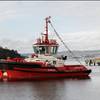Big Names Unite to Push LNG as a Marine Fuel
Carnival Corporation & plc, DNV GL, ENGIE, ENN, GE, GTT, Lloyd’s Register, Mitsubishi Corporation, NYK Line, Port of Rotterdam, Qatargas, Shell, TOTE Inc. and Wärtsilä are among firms that are part of a new cross-industry initiative called SEA\LNG, to accelerate the use of liquefied natural gas (LNG) as a marine fuel.
Explaining the coalition’s objective, Peter Keller, chairman of SEA\LNG and executive vice president of TOTE Inc., said, “We recognize the need to work closely with key players across the value chain, including shipping companies, classification societies, ports, major LNG suppliers, downstream companies, infrastructure providers and OEMs (original equipment manufacturers) to ensure an understanding of the environmental and performance benefits of LNG as a marine transport fuel. SEA\LNG aims to address market barriers and help transform the use of LNG as a marine fuel into a global reality."
More than 90 percent of global trade moves by sea and this trade is expected to increase substantially over the coming years. In terms of ton miles, shipping is the world’s cleanest form of transport. However, the volumes moved are so large that shipping is a significant contributor to global greenhouse gas (~3 percent of the total global 1 ), sulphur oxides (SOx, ~10 percent of the total 2) and nitrogen oxides (NOx, ~15 percent 3) emissions.
The emissions reduction requirements which have come into force around the world to respond to this challenge are increasing demand for LNG as a shipping fuel. LNG offers significant environmental advantages over heavy fuel oil, the main fuel used in shipping today. LNG significantly reduces SOx, NOx and particulate emissions, and can also contribute to the reduction of GHG emissions. LNG is therefore able to offer a fuel solution compliant with both current and anticipated future regulations.
However, while LNG is a competitive fuel relative to current alternatives, LNG infrastructure is needed in ports around the world to enable quick, safe and cost effective bunkering. In parallel, there remains a price premium for LNG-fuelled vessels which can make investment decisions challenging. Furthermore, regulation is not yet globally consistent, which constrains incentives for investment in the sector. SEA\LNG aims to address and help overcome these and other challenges.
Philip Olivier, CEO of ENGIE Global LNG, commented, “Everybody is calling for alternatives to reduce environmental impacts. That’s why we have joined forces to actively promote LNG as a key fuel in maritime transport. LNG has the potential to take a 10 percent market share of global bunker demand by 2030. ENGIE will contribute to achieving this target”.
Tom Strang, senior vice president, Maritime Affairs, Carnival Corporation & plc, said, “By working together proactively across the whole marine LNG value chain we can make the transition to a lower emission marine sector a reality. We are proud to share this aim and to align ourselves with other innovators in this field.”
“This new cross-industry initiative is good news,” said Lauran Wetemans, Shell’s general manager downstream LNG. “To make the transition to LNG as a fuel happen it needs close collaboration with key players across the full value chain. SEA/LNG aims to promote the benefits and potential of LNG fuel, and create a level playing field for LNG with other fuels. It will complement the work being done by other organizations like the Society for Gas as a Marine Fuel”.
“The ground work has been laid for LNG to thrive, but we need a cross-industry approach to realize the full potential of LNG fuelled shipping. Having been at the forefront of LNG fuelled shipping since its beginning, DNV GL is proud to work with innovative partners to help LNG take its place as a key fuel for the future,” said Tjerk-Johan de Vries, region manager West Europe & Africa at DNV GL.
Leo Karistios, gas technology lead, Lloyd’s Register, added, “LNG fuelled shipping has mainly been for the visionaries and, until now, concentrated in specialist ship sectors – short sea shipping and ferries, mainly sailing between two fixed ports. We want to help drive the expansion of LNG as a marine fuel of choice, with not just more short sea and local ships burning gas, but also the deep sea trades.”













